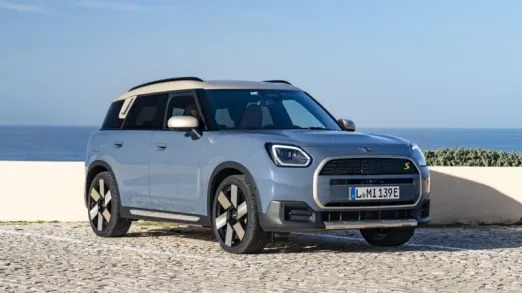
CASCAIS, Portugal — Everything we said about the overgrown size of the 2025 Mini Countryman in John Cooper Works trim that we recently reviewed applies equally to the 2025 Mini Countryman SE ALL4. The former is powered by gas and the latter is electric, but both are the same size. Interestingly, both have about the same number of ponies, too.
To recap, the new Countryman is 5.1 inches longer, 2.4 inches taller and 0.8 inches wider than the second-generation model, which in turn was 8 inches longer and more than 5 inches wider than the first-generation Countryman. A bit chonky, then.
Our hackles may be raised by the size of the 2025 Countryman, especially as Mini claims it’s a “Minimalist All-Rounder” — whatever that’s supposed to mean — but after spending a day actually driving the all-electric SE, we got over it. And we think buyers who care about Mini’s illustrious history like we do will get over it too. It’s not without fault, but the Mini Countryman is more interesting in electrified SE trim than it is in suck-squeeze-bang-blow JCW trim.
The Mini Countryman SE boasts twin electric motors, one up front and one at the rear so that all four wheels are powered. Total system output comes in at 313 horsepower (one lone stallion over the JCW’s figure) and an impressive 364 pound-feet of torque (the gas model is good for 295 lb-ft). That’s sufficient for a 0-60 sprint of 5.6 seconds — a bit behind the top-spec gasser, despite the extra torque, due to a weight penalty of nearly 600 pounds for a total curb weight of 4,400 lbs, but still quick.
Feeding power to the two motors and contributing mightily to the porky weight is a 66.5-kilowatt-hour battery pack. That’s enough capacity to provide up to 245 miles of range (depending on factors that include wheel size), which isn’t bad, but short of all-wheel-drive electric crossover leaders that might be cross-shopped against the Mini, like the Tesla Model Y Long Range (up to 310 miles), Kia EV6 (up to 282) and Nissan Ariya (up to 272). As always, actual range will vary due to driving style, weather and the use of accessories and climate control.
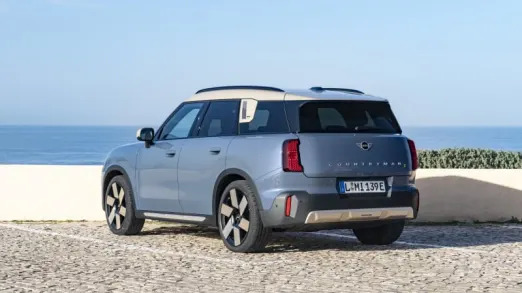
Mini claims a maximum charge rate of 130 kW. Again, that’s not bad, and equal to the Nissan Ariya, but far short of competitors like Tesla (up to 250 kW), Hyundai and Kia (up to 235). Considering its newness on the market, you wouldn’t be wrong to expect some specs that actually move the needle instead of being mid-pack. Still, its max rate is enough to charge from 10-80% in less than 30 minutes in ideal situations, and a lot of owners will charge at home using Mini’s 22-kW AC charging option anyway.
At some point in the fall of 2024, the standard Mini Countryman E will make it Stateside, bringing with it a single 204-hp electric motor powering the front wheels, and we expect it to offer significantly more range. It won’t be as quick, of course, with a 0-60 time of 8.6 seconds.
The dual-motor Countryman SE we drove felt plenty potent, with the signature electric rush of power that comes on strong right when the pedal is pressed and doesn’t seem to slow until extralegal speeds. The extra weight over the Countryman JCW we drove a different day but on similar roads means the electric SE feels a bit more settled over rough pavement, though its suspension is still tuned on the firm side.
Mini has long committed to a ride and handling balance that veers to the side of sporty, and that remains the case with its electric Countryman SE. In fact, while in its sportiest Go Kart Mini Experience drive mode, the overall experience — accounting for the difference in power delivery — wasn’t unlike that of the JCW model we drove. Until, that is, we experimented a bit more with Mini Experience Modes and turned on the faux drive sounds that get pumped into the cabin. In addition to Go Kart, there’s Core Mode, Green Mode, Timeless Mode, Balance Mode, Vivid Mode and Personal Mode, each of which alters the car’s tuning, changes the face of the large round infotainment screen in the middle of the dash and can change interior mood lighting and the sounds inside the vehicle.
The sounds that Mini chose for Go Kart Mode are awfully techy and futuristic, and don’t sound at all like a real electric motor. Think vintage Star Trek and you won’t be far off. Fortunately, for those who revel in the low whoosh of travel by electrons, the sounds can be disabled.
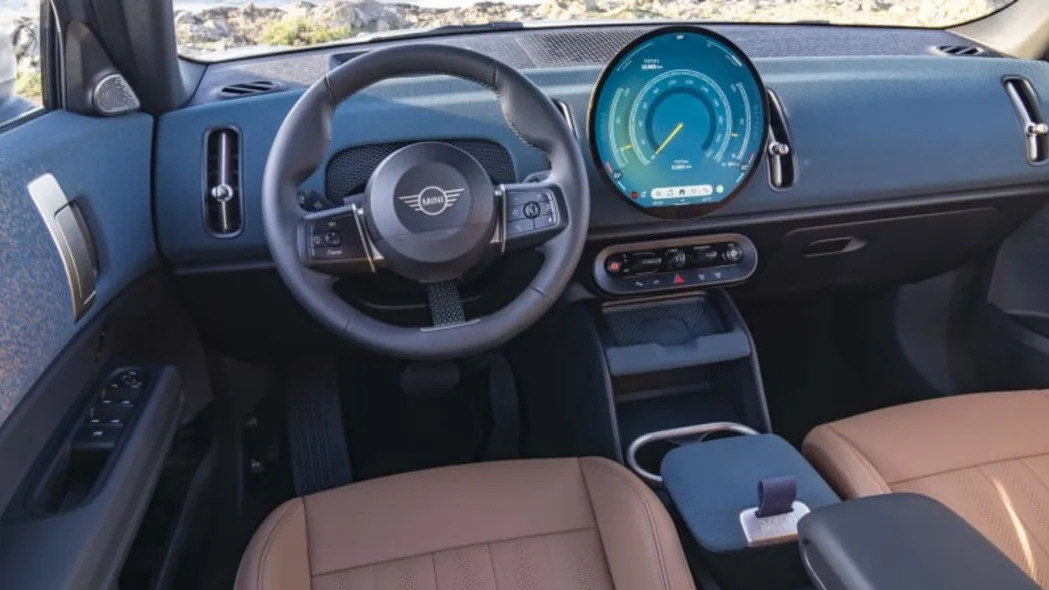
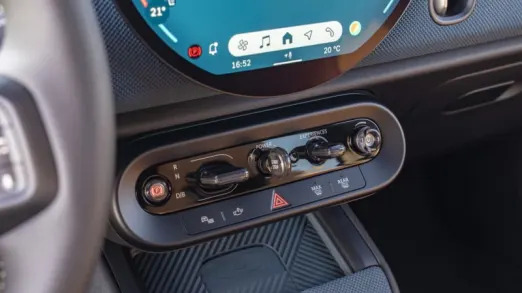
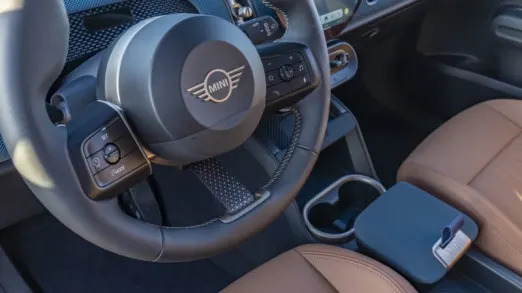
There is no traditional gauge cluster in front of the driver. A flip-up head-up display offers most of the necessary information, like speed and navigation prompts, but almost all of the car’s functions are controlled through the aforementioned circular screen. It’s a touch-sensitive unit that we found pretty easy to use, though information is frustratingly scattered in different areas depending on the chosen Mini Experience Mode. Core Mode best matches the rest of the interior look and feel, and that’s our preferred setting.
Under the big round screen sits a toggle bar that houses the gear selector, a start/stop key that you twist to start the car, the Experience Mode toggle and the volume control. The gear selector offers Reverse, Neutral and Drive/Brake (a separate parking brake button sits to the left), with the D/B mode offering multiple levels of off-throttle braking. As fans of one-pedal EV driving, we put the Countryman SE in its strongest regenerative mode, which also improves efficiency. We didn’t feel any odd sensations while transitioning from regenerative to friction braking.
The rest of the driving experience is pretty much what you’d expect from a Mini. The steering is quick but not darty, and while there isn’t a ton of feel transmitting what the tires are doing to the driver’s hands through the electric rack, everything feels firm and direct. Our tester’s 20-inch wheels look awesome but contribute to the busy ride on bumpy roads.
There’s plenty of space inside due to the vehicle’s growth spurt, and the upright sides and generous amount of glass all around make for a bright and airy cabin. There’s more than 5 inches of fore/aft adjustment for the rear seat, and the seatback angle can also be adjusted. Mini says both elbow and shoulder room are up by an inch or so, though three-across is still going to feel tight back there. The cargo area is also well-sized with nearly 25 cubic feet with the rear seat in place and pushed forward, and over 56 cu ft with the setback folded down.


Mini is as much about style and individuality as it is the actual act of driving, and we were immediately smitten with the fun interior decor, which in our test car featured a blue-green recycled fabric weave on the dash that artfully blended into a light malt brown to match the faux-leather seating surfaces as part of the top-spec Favoured Trim.
Base cars will get an Essential Trim package with a starting price of $46,195 (including a reasonable $995 for destination) that Mini describes as offering “maximum clarity and reduction,” but to us it sounds rather plain with black seats, gloss black and silver accents and a lone textile band on the dashboard. The mid-level option is Classic Trim with black and blue colors with a perforated houndstooth pattern on the faux leather seats. No matter what, you won’t see any chrome inside, a major shift from Mini models of the recent past.
That’s what the 2025 Mini Countryman SE All4 is in general: a major shift for the brand, blending both gasoline and electric powertrains into one model that’s larger than ever before and packed with an ever-increasing amount of technology. Mini no longer means minimalism, regardless of what the brand’s marketing materials may say, and it apparently doesn’t actually have to mean mini in a literal sense. The brand is growing up, and with a reasonable electric range and a roomy-if-still-compact interior, the Mini Countryman SE All4 is well positioned to appeal to buyers looking for a practical but fun and sporty EV for everyday driving duty.




























